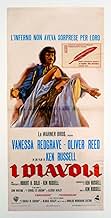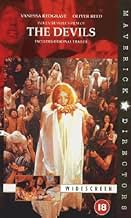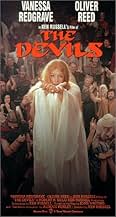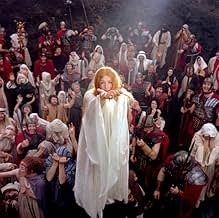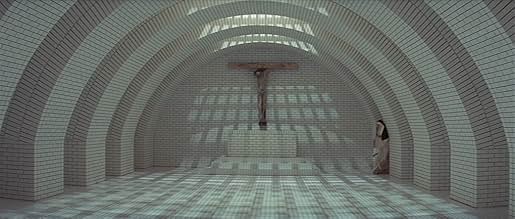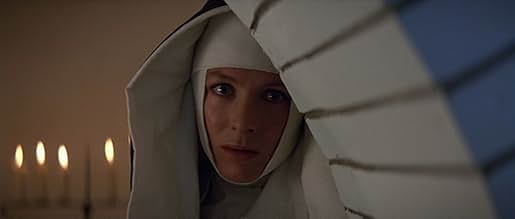En la Francia del siglo XVII, el padre Urbain Grandier busca proteger la ciudad de Loudun del corrupto establecimiento del cardenal Richelieu. La histeria se produce cuando es acusado de bru... Leer todoEn la Francia del siglo XVII, el padre Urbain Grandier busca proteger la ciudad de Loudun del corrupto establecimiento del cardenal Richelieu. La histeria se produce cuando es acusado de brujería por una monja sexualmente reprimida.En la Francia del siglo XVII, el padre Urbain Grandier busca proteger la ciudad de Loudun del corrupto establecimiento del cardenal Richelieu. La histeria se produce cuando es acusado de brujería por una monja sexualmente reprimida.
- Dirección
- Guionistas
- Elenco
- Premios
- 4 premios ganados en total
Izabella Telezynska
- Sister Iza
- (as Iza Teller)
Tony Allen
- Spectator
- (sin créditos)
- Dirección
- Guionistas
- Todo el elenco y el equipo
- Producción, taquilla y más en IMDbPro
Opiniones destacadas
In 17th Century France Cardinal Richelieu gains allegiance with King Louie Xlll in persecuting the Protestant populace. He finds resistance however in the charismatic Father Grandier (Oliver Reid) of Loudon whose walls and lack of religious strife pose a problem to the Cardinal's grand plan. When a sexually repressed nun falsely accuses Grandier of witchcraft, Richelieu's minions go to work to slander and burn.
It is no small order to make the claim that The Devil's is director Ken Russell's most audacious work. Known for pushing the envelope throughout his career The Devil is a relentless non-stop depiction of witch hunt depravity graphically presented by Russell who takes things to such a fever pitch you wonder if he has control during moments as the literal orgiastic trial runs into overtime. Featuring some of Russell's most outlandish as well as outstanding scenes and compositions it's devastating brutality never let's up with the opening portion of the film dealing with a plague. Even comedy relief such as the King's target practice having a very dark tone to it.
As Grandier, Reid effectively shows both virility and sensitivity as he defends the city while left vulnerable to carnal delight and love. Vanessa Redgrave's horny hunch back nun may be the most challenging role of her career that she gruesomely surmounts, the results riveting. Max Adrian as a quack doctor leads a supporting cast of well defined misanthropes bent on revenge and power.
Russell's interpretation of actual history ( with a mighty contribution from wife Shirley's outstanding costuming) paints some remarkable canvases throughout the Devils, most of it hard to look at and you walk away from it amazed and appalled; impressed and ill. The Devils is one tough watch.
It is no small order to make the claim that The Devil's is director Ken Russell's most audacious work. Known for pushing the envelope throughout his career The Devil is a relentless non-stop depiction of witch hunt depravity graphically presented by Russell who takes things to such a fever pitch you wonder if he has control during moments as the literal orgiastic trial runs into overtime. Featuring some of Russell's most outlandish as well as outstanding scenes and compositions it's devastating brutality never let's up with the opening portion of the film dealing with a plague. Even comedy relief such as the King's target practice having a very dark tone to it.
As Grandier, Reid effectively shows both virility and sensitivity as he defends the city while left vulnerable to carnal delight and love. Vanessa Redgrave's horny hunch back nun may be the most challenging role of her career that she gruesomely surmounts, the results riveting. Max Adrian as a quack doctor leads a supporting cast of well defined misanthropes bent on revenge and power.
Russell's interpretation of actual history ( with a mighty contribution from wife Shirley's outstanding costuming) paints some remarkable canvases throughout the Devils, most of it hard to look at and you walk away from it amazed and appalled; impressed and ill. The Devils is one tough watch.
When reading the following review, please keep in mind that I saw this film in slightly unorthodox circumstances. Without meaning to sound smug, the screening I attended took place at my University, was chaired by Ken Russell and was of a restored version of The Devils. The missing footage found by the critic Mark Kermode had been spliced back in and the film restored to the director's vision as close as possible. Given that I've never seen the original edit released to cinemas back in the 1970s and that this was only the second time this version had been screened, I think its fair to estimate that the film I'm reviewing will be significantly different to the one that is widely available so please keep that in mind.
Anyway...starting with a bizarre sequence involving an androgynous, foppish King prancing around a theatre stage done up like an Egyptian Queen, Ken Russell's The Devils is a film that over the course of its subsequent hour and forty minutes is liable to offend as many people as it will entertain. The extravagance of the Royal French Court filled with laughing nobles and brown nosing politicians resplendent in the very finest dark ages fashion is soon juxtaposed when the film turns a stark gaze on a rotting countryside filled with pestilence and disease. Maggot infested corpses line the road and the attention is quickly turned on the town of Loudun, where Priest Father Grandier battles not only the plague, but the political schemers who want to demolish the walls. Grandier is such a charismatic public figure however that the politicians are powerless, until they elaborate a plan to have him tarnished with accusations of blasphemy.
Central to this conspiracy is a chapter of Nuns living near by, of whom the hunched Sister Jeanne proves instrumental. Scared of her own sexual desires, the woman is driven mad by her very human nature and soon, the inquisition are knocking on her door and every woman in the building is being tortured and brain washed in the name of Christianity. The evils of religious fanaticism are plain to see, with Michael Gothard's scene stealing extremist Father Barre being the most disgusting example of a Priest you are ever likely to see on film. He batters and humiliates women for the sake of getting his own way and is so inflexible that he will send people to their deaths rather than admit his own fallibility. Controversial scenes abound as Barre's determination brings about nothing but misery, with the brainwashed nuns stripping off and indulging in a mass orgy, culminating in perhaps the most offensive scene when a statue of Christ is pulled down from the chapel walls and used by the nuns as a sexual play thing.
While it may depict blasphemy though, the film itself is not blasphemous and believe it or not, actually celebrates Christianity. It does so through the figure of Grandier (Oliver Reed at his very best), a man whose faith in God is so strong that he will not allow the misled elders of the Church deviate him from his path. He isn't a perfect man and has a weakness for the fairer sex, but he will not bow down to pressure or allow physical pain to weaken his love of God, he is a fine depiction of a Priest of which the Church can be proud.
However, religious sermonising isn't the chief attraction because let's face it, the reason most of us would want to see this movie is because it's controversial. With the aforementioned cavorting on the cross and nun orgies it's not hard to see why and the Inquisition don't exactly come off particularly well either as they stride around the countryside, bullying and torturing and ultimately teaching their flock to hate, not to love. Furthermore, The Devils is possessed (pun very much intended) by a ceaseless, madcap energy that is easy to get swept up in and over the course of the film, you will witness flagellation, nun on nun lesbian action, deranged inquisitors chanting "confess" as they beat people with hammers and (perhaps most bizarrely of all), Oliver Reed duelling with a man using a stuffed crocodile in place of a sword.
Yes, it is a bit uneasy to watch sometimes. Yes, at times it does resemble little more than visual extremity taken to the limit and no its not likely to find it's way into the Pope's DVD collection any time soon. The underlying message is ultimately a pure one though and it has the added benefit of being one of the most insane films you're ever likely to see, as well as making you glad you don't live in the middle ages. If you ever get a chance to see the restored version I couldn't recommend it higher.
Anyway...starting with a bizarre sequence involving an androgynous, foppish King prancing around a theatre stage done up like an Egyptian Queen, Ken Russell's The Devils is a film that over the course of its subsequent hour and forty minutes is liable to offend as many people as it will entertain. The extravagance of the Royal French Court filled with laughing nobles and brown nosing politicians resplendent in the very finest dark ages fashion is soon juxtaposed when the film turns a stark gaze on a rotting countryside filled with pestilence and disease. Maggot infested corpses line the road and the attention is quickly turned on the town of Loudun, where Priest Father Grandier battles not only the plague, but the political schemers who want to demolish the walls. Grandier is such a charismatic public figure however that the politicians are powerless, until they elaborate a plan to have him tarnished with accusations of blasphemy.
Central to this conspiracy is a chapter of Nuns living near by, of whom the hunched Sister Jeanne proves instrumental. Scared of her own sexual desires, the woman is driven mad by her very human nature and soon, the inquisition are knocking on her door and every woman in the building is being tortured and brain washed in the name of Christianity. The evils of religious fanaticism are plain to see, with Michael Gothard's scene stealing extremist Father Barre being the most disgusting example of a Priest you are ever likely to see on film. He batters and humiliates women for the sake of getting his own way and is so inflexible that he will send people to their deaths rather than admit his own fallibility. Controversial scenes abound as Barre's determination brings about nothing but misery, with the brainwashed nuns stripping off and indulging in a mass orgy, culminating in perhaps the most offensive scene when a statue of Christ is pulled down from the chapel walls and used by the nuns as a sexual play thing.
While it may depict blasphemy though, the film itself is not blasphemous and believe it or not, actually celebrates Christianity. It does so through the figure of Grandier (Oliver Reed at his very best), a man whose faith in God is so strong that he will not allow the misled elders of the Church deviate him from his path. He isn't a perfect man and has a weakness for the fairer sex, but he will not bow down to pressure or allow physical pain to weaken his love of God, he is a fine depiction of a Priest of which the Church can be proud.
However, religious sermonising isn't the chief attraction because let's face it, the reason most of us would want to see this movie is because it's controversial. With the aforementioned cavorting on the cross and nun orgies it's not hard to see why and the Inquisition don't exactly come off particularly well either as they stride around the countryside, bullying and torturing and ultimately teaching their flock to hate, not to love. Furthermore, The Devils is possessed (pun very much intended) by a ceaseless, madcap energy that is easy to get swept up in and over the course of the film, you will witness flagellation, nun on nun lesbian action, deranged inquisitors chanting "confess" as they beat people with hammers and (perhaps most bizarrely of all), Oliver Reed duelling with a man using a stuffed crocodile in place of a sword.
Yes, it is a bit uneasy to watch sometimes. Yes, at times it does resemble little more than visual extremity taken to the limit and no its not likely to find it's way into the Pope's DVD collection any time soon. The underlying message is ultimately a pure one though and it has the added benefit of being one of the most insane films you're ever likely to see, as well as making you glad you don't live in the middle ages. If you ever get a chance to see the restored version I couldn't recommend it higher.
A few movies are so controversial that the Movie industry does their best to kill them off (see Terry Gilliams' "Brazil"). Such was the case with "The Devils" First, to clear a few things up...this did NOT come from a play, nor was it a novel. It is based on Aldous Huxley's painstakingly researched religious history of the famous Loudun exorcisms during the time of Richelieu. The book may be out of print, but my wife found a copy published in 1952 by Chatto & Windus. There are some more recent publications, but this one is lovely, with an engraving of Bishop Urban Grandier(the main character) dating back to 1627. Huxley actually includes original letters, which still exist, written by the participants of this travesty. Much of the dialogue of the film is directly from Huxley. The vision however is uniquely Russell's. When this movie was originally released, it was given an X rating, not due to sex, or even violence, although there is some of each. The plain fact is that the film in its original form is simply overpowering. The Movie Review board thought so! I was fortunate enough to see the original uncut version, rated X at the local art-house upon its release. This film is a shortened version. While still worthwhile, this film absolutely SCREAMS for a Criterion Collection restoration to its original (brilliant) form.
British director Ken Russell's adaption of Aldous Huxley's book "The Devils of Loudun" is one of the most origional, controversial and daring films ever made. The film takes place in 17th-century France and centres on the hypocritical and licentious behaviour of debauched priest Father Urbain Grandier, brilliantly played by Oliver Reed. A second plot strand involves the humpbacked nunn Sister Jeanne, played by Vanessa Redgrave, who, along with her fellow nuns, is obsessed with Grandier. When the nuns become seemingly possessed, disgruntled representatives of the Catholic Church and corrupt officials move in and seize their opportunity to get rid of Grandier.
The film gets off to an excellent start, gradually building up the tension and highlighting the flaws within the Catholic religion. However the middle section involving the possession of the nuns is far too theatrical and over-the-top and the action becomes weighed down by the overbearing performance of Michael Gothard as Father Barre and Derek Jarman's lurid sets. The final section of the film, however, is mightily impressive and well-scripted and benefits hugely from Oliver Reed's committed performance.
While Vanessa Redgrave impresses in the role of Sister Jeanne this is Oliver Reed's film and a performance which proves he was a great actor and not just a great hellraiser. This film illustrates that he is easily the equal of his contemporaries including Caine, Connery, Harris and Finney.
While director Ken Russell's films can range from the very good to the absolutely awful "The Devils" is without doubt his best. This is perfect material for Russell to work with and the ideal outlet for his unique vision. Russell was part of the new breed of controversial directors who emerged in the late 1960s and 1970s who courted controversy with images of sex, nudity, violence and shocking images. "The Devils" is no exception and while it will by no means be to everyone's taste it should be commended for its daring take on the hypocritical side to religion and for helping to pave new ground in cinema.
The film gets off to an excellent start, gradually building up the tension and highlighting the flaws within the Catholic religion. However the middle section involving the possession of the nuns is far too theatrical and over-the-top and the action becomes weighed down by the overbearing performance of Michael Gothard as Father Barre and Derek Jarman's lurid sets. The final section of the film, however, is mightily impressive and well-scripted and benefits hugely from Oliver Reed's committed performance.
While Vanessa Redgrave impresses in the role of Sister Jeanne this is Oliver Reed's film and a performance which proves he was a great actor and not just a great hellraiser. This film illustrates that he is easily the equal of his contemporaries including Caine, Connery, Harris and Finney.
While director Ken Russell's films can range from the very good to the absolutely awful "The Devils" is without doubt his best. This is perfect material for Russell to work with and the ideal outlet for his unique vision. Russell was part of the new breed of controversial directors who emerged in the late 1960s and 1970s who courted controversy with images of sex, nudity, violence and shocking images. "The Devils" is no exception and while it will by no means be to everyone's taste it should be commended for its daring take on the hypocritical side to religion and for helping to pave new ground in cinema.
I can never understand why "The Devils", which was such a major film and caused such controversy, never became a cult classic being shown every other week on cable TV. This film totally annihilates all the trashy "straight-to-video" horror films. Based on true events in 17th century France, this film is one of the most horrifying tales of man's intolerance: religious and sexual.
The tale begins with an outbreak of the plague, which the folk of the middle ages, with typical misunderstanding of the real cause, rat fleas, believed that someone was to blame. Who more convenient a scapegoat than Father Grandier, played by the notorious Oliver Reed an actor who ended his rambunctious life by dropping dead in a bar. The sexual appeal of Fr. Grandier drives the supposedly celibate clergy into a frenzy of jealousy. A group of nuns, led by a noblewoman who has been forced into the convent due to her physical deformity and therefore, lack of marriageable options, joins in the hysteria which is not satisfied until Fr. Grandier is burned at the stake.
Although set in France in the middle ages, a lot of the hysteria can be seen today, in our more enlightened times. Just witness the periodic witch hunts in the United States, such as the furore over the alleged Satanic cults running day care centers, not to mention the reds under the beds hysteria of the 50's.
This was one of Ken Russell's most controversial films, and definitely very 70's in its style, after all, we had Mick Jagger and Twiggy perfectly cast as decadent French nobility, and it has taken 20+ years to see how right on the mark he was.
Although Russell was the hottest thing in cinema for a while, he faded like a discarded fashion as every wannabe copied his style, but without being able to understand what is was that set Ken Russell apart. Unfortunately Russell did not help his reputation by becoming more and more the icon of bad taste. Eventually he became a parody and the fickle who had formally worshipped his genius could not disassociate themselves quickly enough.
Like Orson Welles, Ken Russell's brilliance will not be realized until a new generation discovers his work. I recommend "The Devils" along with "The Music Lovers" as his best work.
The tale begins with an outbreak of the plague, which the folk of the middle ages, with typical misunderstanding of the real cause, rat fleas, believed that someone was to blame. Who more convenient a scapegoat than Father Grandier, played by the notorious Oliver Reed an actor who ended his rambunctious life by dropping dead in a bar. The sexual appeal of Fr. Grandier drives the supposedly celibate clergy into a frenzy of jealousy. A group of nuns, led by a noblewoman who has been forced into the convent due to her physical deformity and therefore, lack of marriageable options, joins in the hysteria which is not satisfied until Fr. Grandier is burned at the stake.
Although set in France in the middle ages, a lot of the hysteria can be seen today, in our more enlightened times. Just witness the periodic witch hunts in the United States, such as the furore over the alleged Satanic cults running day care centers, not to mention the reds under the beds hysteria of the 50's.
This was one of Ken Russell's most controversial films, and definitely very 70's in its style, after all, we had Mick Jagger and Twiggy perfectly cast as decadent French nobility, and it has taken 20+ years to see how right on the mark he was.
Although Russell was the hottest thing in cinema for a while, he faded like a discarded fashion as every wannabe copied his style, but without being able to understand what is was that set Ken Russell apart. Unfortunately Russell did not help his reputation by becoming more and more the icon of bad taste. Eventually he became a parody and the fickle who had formally worshipped his genius could not disassociate themselves quickly enough.
Like Orson Welles, Ken Russell's brilliance will not be realized until a new generation discovers his work. I recommend "The Devils" along with "The Music Lovers" as his best work.
¿Sabías que…?
- TriviaDerek Jarman's sets are modeled on the sets of Fritz Lang's Metrópolis (1927). Ken Russell wanted to avoid the clichéd look of period films and insisted on anachronistic, even futuristic, design. Russell's guidance to Jarman was that it should echo the 'rape in a public toilet' line from the Huxley novel that inspired the film.
- ErroresEarly in the movie when Urbain Grandier (Oliver Reed) is seen grooming his hair. It is a close-up of him supposedly looking at a mirror in the upper left hand corner of the screen, behind the viewer. Obviously there is no mirror as he consistently misses combing the more egregiously messed up parts of his hair and instead repeatedly combs the portions that are already groomed. In fact when he is done, his hair is still messed up.
- Créditos curiososAt the start of the film: "This film is based upon historical fact. The principal characters lived and the major events in the film actually took place."
- Versiones alternativasIn 2012 the BFI persuaded Warners to allow them to release the film on video in the UK. Warners refused to allow the director's cut at all and would only allow the BFI to release the original 'X' certificate version on DVD. Warners refused permission to allow a hi rez release. The BFI produced a superb DVD transfer for the first time in its proper 2.35:1 ratio. The Channel 4 documentary 'Hell on Earth' was included but the 'Rape of Christ' sequence was removed. They also cut a line of dialogue when one of the actors refers to Warners as a bunch of 'c**ts'. Before this in the USA the 'unrated' version appeared as an upcoming release complete with sleeve art. 24 hours later Warners stopped the release!
- ConexionesFeatured in Omnibus: Russell's Progress (1971)
- Bandas sonorasBourrée d'Avignon
from Secretum musarum (1615)
Music by Nicolas Vallet.
Played as the king's dance in the opening.
Selecciones populares
Inicia sesión para calificar y agrega a la lista de videos para obtener recomendaciones personalizadas
- How long is The Devils?Con tecnología de Alexa
Detalles
- Fecha de lanzamiento
- Países de origen
- Idiomas
- También se conoce como
- Los diablos
- Locaciones de filmación
- Productora
- Ver más créditos de la compañía en IMDbPro
Taquilla
- Total a nivel mundial
- USD 2,293
- Tiempo de ejecución1 hora 51 minutos
- Mezcla de sonido
- Relación de aspecto
- 2.35 : 1
Contribuir a esta página
Sugiere una edición o agrega el contenido que falta

Principales brechas de datos
What is the Hindi language plot outline for Los demonios (1971)?
Responda
![Trailer [EN]](https://m.media-amazon.com/images/M/MV5BYjgxZTMwNzYtYmE4Zi00ZDNjLWJkZjUtNTQ1NGQ1ZWRmMDAwXkEyXkFqcGdeQXRyYW5zY29kZS13b3JrZmxvdw@@._V1_QL75_UX500_CR0)

